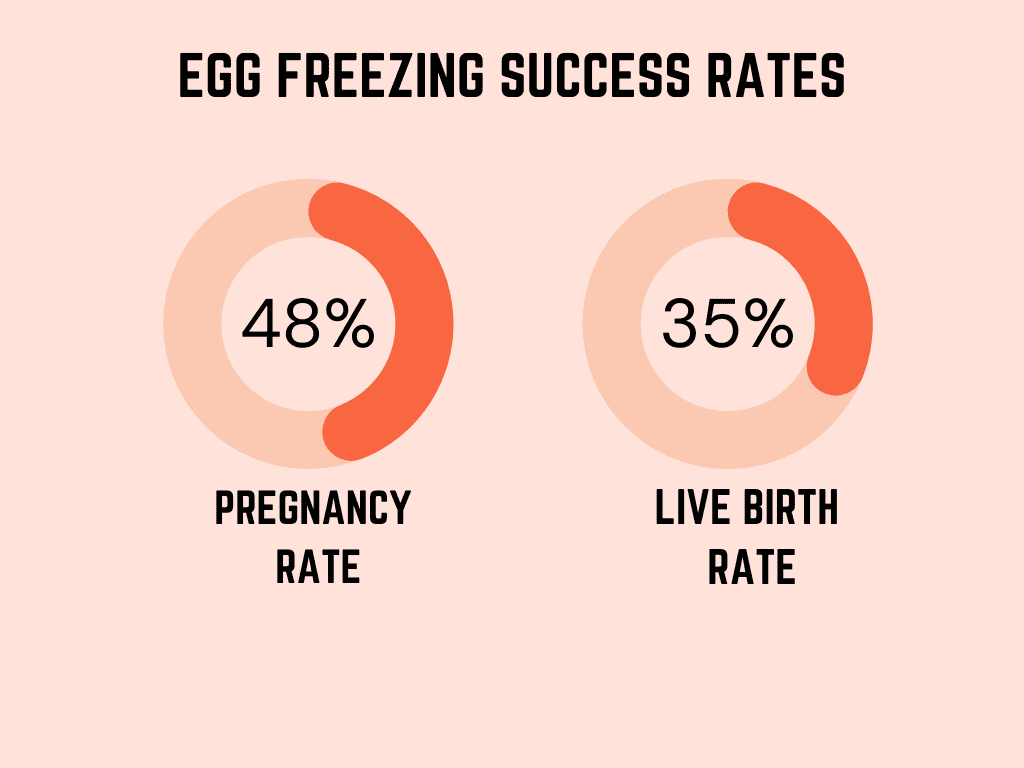Are you looking to extend your family planning timeline? Egg freezing provides the freedom to hit pause on your biological clock.
Unsurprisingly, egg freezing is more popular today than ever before. According to the CDC, the rise has been dramatic, from 32,180 frozen eggs in 2011 to 129,692 in 2020. This interest is also reflected in the market value, which stands at an impressive $461.4 million. This number will likely soar to $1264.9 million by 2033.
This article breaks down the egg-freezing process so you know what to expect. It covers: Table of Contents
What is Egg Freezing, and How Does it Work?
During egg freezing, doctors take eggs from your body and freeze them. This is useful if you want to have children later.
When you’re ready, doctors can use these eggs to have a baby. This maintains your chances of having a baby.
Who is a Good Candidate for Egg Freezing?
According to the NHS, you are a good candidate for egg freezing if:
- You are not ready to have a baby yet.
- You have a low number of eggs. This may be due to some medical conditions.
- Your partner is unable to provide sperm at the time of IVF treatment.
How to Prepare for Egg Freezing and Retrieval?
Before freezing your eggs, you’ll see a doctor to discuss your health and fertility. They will check your medical history and explain the process.
Next, you’ll take particular medicines to help your body make more eggs. You’ll also have regular check-ups with ultrasound scans and blood tests. This allows the doctor to see how your eggs grow and change your medicine if needed.
On the day of the procedure, don’t eat or drink. Wear clothes that are easy to put on and comfortable. Also, plan for someone to drive you home. You might feel sleepy after the procedure.
To maximize your egg-freezing chances, the CDC recommends:
- Taking folic acid every day.
- Reducing alcohol intake.
- To quit smoking.
- Cutting down on caffeine.
- Staying active.
- Eating healthy.
- Seeking treatment for any health problems you have.
The Egg Retrieval Process: A Step-by-Step Guide
Egg retrieval is an essential part of egg freezing. Here’s a step-by-step breakdown:
- Step 1 (Ovarian stimulation). For about 8 to 14 days, you’ll get hormones like FSH and LH to help your eggs grow and mature. Doctors closely monitor you during this phase, using ultrasound and blood tests.
- Step 2 (Trigger shot). When your eggs look ready, you’ll get a particular shot that helps them finish maturing. This gets them ready for retrieval.
- Step 3 (Retrieval day). About 34 to 46 hours after the shot, doctors use a special needle and ultrasound to find and take your eggs. This usually takes about 15 to 20 minutes. The needle goes through the vagina to reach the eggs. You’ll receive anesthesia to make sure you’re comfortable during this process.
- Step 4 (Egg collection). The doctor checks the eggs after retrieving them. Then, they separate the eggs from their fluid and freeze them for later use.
Professionals monitor the process to ensure the best possible outcome. This also ensures your recovery from the anesthesia before going home.
Post-Egg Freezing and Retrieval Care and Recovery
After your egg retrieval, taking good care of yourself is crucial. This includes:
- Rest. Take it easy on the day of the procedure. Go home and relax to recover. Also, avoid heavy workouts or strenuous activities for 24 to 48 hours. Light exercises like walking are okay.
- Hydration and eating well. Drink plenty of water and eat nutritious foods to help your body recover.
- Being aware of any signs of complications. For example, too much bleeding, severe pain, or anything else unusual.
- Pain management. If you have pain or cramping, you can take over-the-counter painkillers. A heating pad on your belly can also help.
- Handling bleeding. If you have light vaginal bleeding, use sanitary pads. Avoid tampons during this time.
- Seeking emotional support. This can be an emotional time. Talk to your family or friends, or join a support group for comfort and advice.
Remember, it’s normal to feel a bit tired or have some pain after the procedure. But if anything feels off or you’re worried, call your doctor right away. They are there to help you through this process.
What Factors Influence the Quality of Retrieved Eggs?
Several factors influence egg quality. These include:
- Age. Younger women have better-quality eggs. This leads to a higher chance of successful freezing. A study found that women over 35 had a lower chance of freezing more than three good eggs than younger women. This is because aging increases the likelihood of egg abnormalities.
- Ovarian reserve. A high ovarian reserve means you’re more likely to produce more quality eggs. In turn, your frozen eggs are likely to be of higher quality.
- Stimulation protocol. The method of ovarian stimulation can affect egg quality.
- Lab conditions. The expertise of embryologists and lab quality are crucial. Eggs need precise storage conditions, like ultra-cold temperatures, to maintain quality. Poor storage or contamination can degrade egg quality.
- Lifestyle choices. Your diet and physical activity levels leading up to egg retrieval are essential. A healthy lifestyle not only improves reproductive health but also enhances egg quality. Likewise, smoking and exposure to environmental toxins can reduce egg quality.
How Can You Optimize Your Chances of Retrieving High-Quality Eggs?
Understandably, improving the chances of retrieving high-quality eggs involves the following:
- Diet. A diet rich in antioxidants, vitamins, and minerals can make a big difference. Studies have shown that such a diet can lead to more embryos available for IVF compared to a regular diet.
- Exercise. Regular physical activity is crucial. It’s linked to a reduced risk of infertility and better egg quality. Likewise, avoid sitting for long periods, as high sedentary behavior can lower egg quality.
- Avoiding harmful substances. Stay away from alcohol and smoking. Smoking mainly affects egg quality, making the eggs more challenging for sperm to penetrate.
- Stress reduction. Studies link stress to poorer egg quality. Thus, techniques like yoga, meditation, and mindfulness can balance hormones and maintain fertility.
- Advanced cryopreservation. Opt for vitrification, a rapid freezing procedure that reduces egg damage.
- Genetic testing. This helps identify embryos with the best chance of successful implantation.
How Long Can Frozen Eggs Be Stored?
Cryopreserved eggs are usable for 5 to 10 years. But, this time frame can vary depending on individual circumstances and legal guidelines. For example, eggs frozen at a younger age are viable for longer.
What are the Success Rates of Egg Freezing and Embryo Transfer?
Pregnancy and live birth rates are a measure of egg-freezing success. One research studied 1172 freezing cycles. It reported an 81.8% frozen egg survival rate. The clinical pregnancy rate per transfer was 41.4%. Another study reported a 74% egg survival rate and a 67% egg fertilization rate. This led to a 48% clinical pregnancy rate per embryo transfer. The live birth rate was 35%.
Please remember, as discussed, success rates can vary based on many factors.
How Much Does Egg Freezing Cost?
| SGD | USD | |
| Initial consultation | 500-1500 | 350-1000 |
| Ovarian stimulation | 3000-6000 | 2000-4000 |
| Monitoring | 2000-4000 | 1500-3000 |
| Egg retrieval | 5000-10,000 | 3500-7000 |
| Anesthesia | 500-1500 | 350-1000 |
| Cryopreservation | 800-1500 | 600-1200 |
| Total | 11,800-25,000 | 8300-17,200 |
Takeaway
Egg freezing is a promising option that puts you in control. It’s a path that combines cutting-edge science with personal empowerment. Thus, it allows you to safeguard your fertility against the biological clock.
It’s vital to approach the process with a clear understanding. This includes understanding the procedures, costs, and potential outcomes. In addition, we encourage you to engage in open discussions with fertility specialists. Also, seek support from loved ones and consider all aspects of this journey. It’s about making an informed choice that aligns with your life’s narrative.If you’re ready, take the first step today and click here.
Anna Haotanto is the Founder of Zora Health and a passionate advocate for women’s empowerment. Anna’s personal experiences with egg-freezing, PCOS, perimenopause and the challenges of fertility have fueled her mission to provide high-quality information, financing, and support to help women and couples navigate their fertility journeys with confidence. She is also recognised for her achievements in finance, entrepreneurship, and women’s empowerment, and has been featured in various media outlets. You can also follow her on Linkedin or Instagram.





